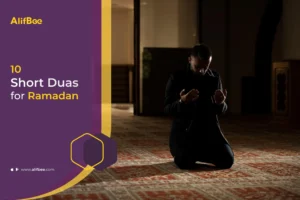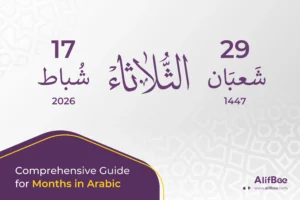Five main occasions in Islam are celebrated by Muslims around the world every year. Each holds a unique significance and commemorates a pivotal moment in Islamic history.
In this blog, we will explore the happy occasion that follows the holy month of Ramadan, Eid Al-Fitr. We will also talk about Eid Al-Adha, which is celebrated during the annual Haj season (Pilgrimage to Mecca). Other main occasions in Islam include the Islamic New Year, Laylat al-Qadr (The Night of Decree), and Isra and Mi’raj.
Each of these events holds profound meaning and offers unique opportunities for reflection, worship, and communal bonding within the Muslim faith.
Join us as we journey through these significant moments in the Islamic calendar, understanding their historical roots and how they are celebrated across the Muslim world. inI
Occasion 1 : عيدُ الفِطر
Eid al-FitrEid al-Fitr, known as the “Festival of Breaking the Fast,” marks the end of Ramadan, the holy month of fasting. It is a happy occasion where Muslims celebrate the completion of a month of fasting, prayer, and reflection. The day begins with a special prayer in the congregation, followed by visits to friends and family, and the giving of charity to ensure those less fortunate can join the celebrations.
Occasion 2 : عيدُ الأَضحى
Eid al-Adha Eid al-Adha, or the “Festival of Sacrifice,” is celebrated to honor the willingness of Prophet Ibrahim to sacrifice his son as an act of obedience to God, before God provided him with a ram to sacrifice instead. It coincides with the climax of the Hajj pilgrimage to Mecca, which is an obligation for Muslims who are physically and financially able to undertake it once in their lifetime. Eid al-Adha is marked by the sacrifice of an animal (such as a sheep, goat, or cow), with the meat distributed among family, friends, and the poor.
Occasion 3 : رأسُ السَّنةِ الهِجريّةِ
Ra's al-Sanah al-Hijriyia - Islamic New Year The Islamic New Year, also known as Hijri New Year, marks the beginning of the new Islamic calendar year. This day commemorates the migration (Hijra) of Prophet Muhammad (Peace be upon him) from Mecca to Medina in 622 CE, an event that led to the establishment of the first Muslim community based on Islamic teachings.
Occasion 4 : ليلةُ القَدرِ
Laylat al-Qadr (The Night of Decree) Laylat al-Qadr, known as the “Night of Decree”, is the holiest night in the Islamic calendar. It commemorates the night during Ramadan when the Quran was first revealed to Prophet Muhammad (Peace be upon him). On this night, which falls within the last ten nights of Ramadan, God’s blessings and mercy are abundant, sins are forgiven, and prayers are answered.
Occasion 5 : الإسراءُ والمِعراجُ
Isra and Mi'raj Isra and Mi’raj are two parts of a miraculous journey that Prophet Muhammad (Peace be upon him) took in one night. Isra refers to his night journey from Mecca to Masjid Al-Aqsa, where he led other prophets in prayer. Mi’raj refers to his ascension from Masjid Al-Aqsa to the heavens, where he met various prophets, was shown the signs of God, and received instructions on the five daily prayers.
Final word
Now that we have explored these significant occasions, it becomes clear that they are not just markers of religious observance but also opportunities for people to rekindle their faith, reflect on the teachings of Islam, and express gratitude and solidarity.
f you liked this blog and felt interested in learning more about the Arabic Language, we invite you to learn more through our unique learning app.
The app offers a wide range of exercises tailored to suit all skill levels and includes quick lessons prepared by our language experts, and daily scenarios rich with Arabic culture. The app also features live statistics for easy and insightful progress tracking.
Are you interested in reading more blogs about Ramadan? Check out our blog on Ramadan rituals and what they mean here.








